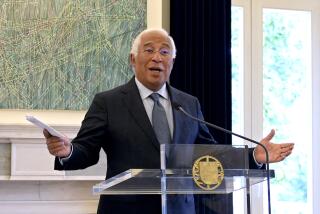Italian Judge Spearheading Anti-Graft Drive Resigns : Corruption: Jurist complains of outside interference. Prime Minister Berlusconi is a target of his investigations.
- Share via
ROME — The judge who has become the leader and symbol of Italy’s biggest anti-corruption drive against the highest echelons of political and economic power resigned Tuesday, complaining that he could no longer carry out his duties because of outside interference.
Judge Antonio Di Pietro’s resignation, although rumored for days, was the latest bombshell in the contentious struggle between a right-wing government and the team of hard-nosed investigating magistrates whom critics accuse of pursuing a left-wing agenda.
In a three-page letter to his superior, Di Pietro, who began investigating bribery and corruption between Italian business and political figures 2 1/2 years ago, alluded to the growing public and political attention as damaging to his investigations.
The probe, known as Mani Pulite (Clean Hands), triggered the downfall this year of Italy’s political Establishment parties that had governed for half a century. Now, Prime Minister Silvio Berlusconi, a billionaire media magnate and political rookie who improbably rose to power, is one of the judge’s targets.
In his letter to Francesco Saverio Borrelli, chief prosecutor of Milan, Di Pietro wrote: “Especially recently, my duties as a magistrate are interpreted increasingly as a personal accomplishment.”
He said events such as street demonstrations, both for and against the work of his team of investigating magistrates, were an impediment to what he called “a balanced judicial solution.”
Di Pietro, 44, also alleged that his decisions were being taken “as political side-taking” that lately had tended to transform the work of the magistrates into “a sort of judicial metaphor for the division of political spoils.”
“I feel used,” wrote the judge who has been hailed as a hero in Italy’s so-called era of a new republic.
He accused the press of plastering him on the front page, his exploits put there “either by anyone who wants to put me against his enemies or by anyone who wants to accredit a nonexistent political end to my normal judicial activities.”
So far, Di Pietro’s investigations into what became an entrenched system of payoffs to political figures and parties in return for public contracts have involved about 3,000 politicians and business people.
Since the investigations began, there have been government attempts to curtail or short-circuit them with decrees and legislation. One such attempt recently sought to abolish preventive detention for suspects in corruption cases.
The resignation announcement came while Di Pietro was being televised in a Milan court conducting one of Italy’s biggest bribery and corruption trials. It caused immediate consternation, a chorus of lamentation and cries of horror from public and political circles. The stock market fell and the lira suffered an immediate decline against international currencies.
Accepting Di Pietro’s resignation, Chief Prosecutor Borrelli denied rumors of his own resignation. He praised Di Pietro’s work and alluded to “a climate of growing injurious hostility” that surrounded that work.
In a statement from Budapest, Hungary, where he is attending a meeting of the Conference on Security and Cooperation in Europe, Berlusconi expressed regret over the resignation, saying Di Pietro “had won the respect of Italians.”
“His decision to quit the magistracy leaves a bitter taste,” the prime minister said, “even for those who considered some aspects of his inquiries somewhat debatable.”
More to Read
Sign up for Essential California
The most important California stories and recommendations in your inbox every morning.
You may occasionally receive promotional content from the Los Angeles Times.












